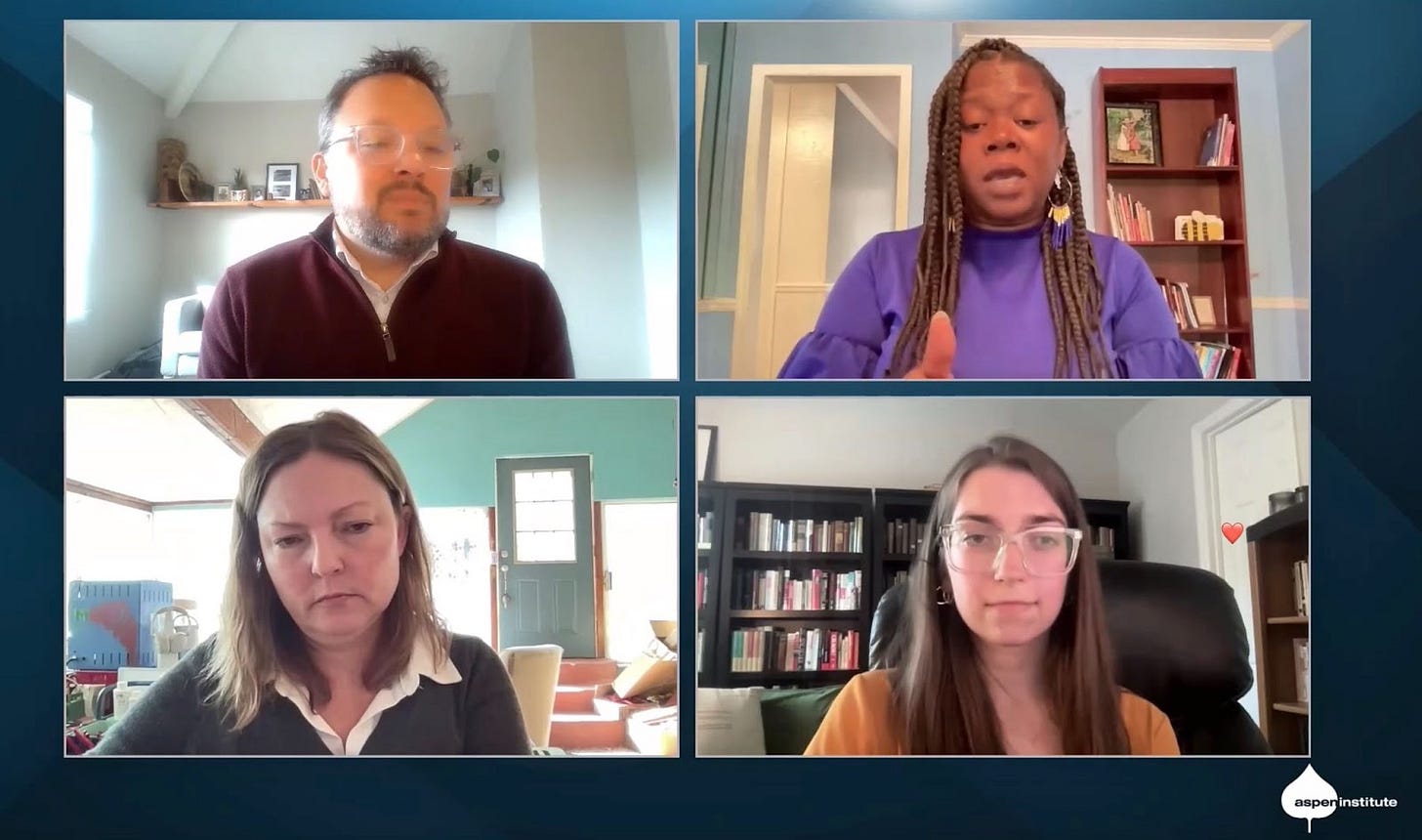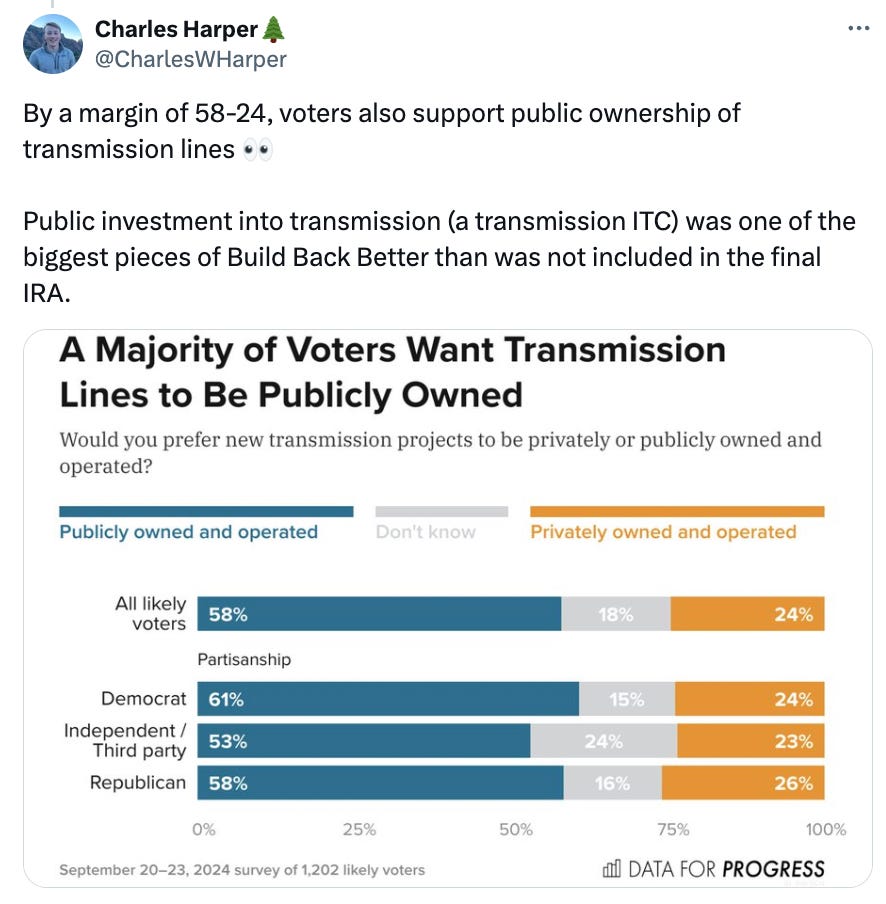Voters Want Polluters To Help Fund FEMA
Welcome back to Data for Climate Progress — your one-stop shop for all things climate at Data for Progress.
Welcome back to Data for Climate Progress — your one-stop shop for all things climate at Data for Progress. Catch us here every month for our latest climate polling, juicy insights, and can’t-miss reading lists.
As always, we’d love to hear from you — drop us (Grace Adcox and Catherine Fraser) a line at gracea@dataforprogress.org and catherine@dataforprogress.org. Forwarded this email? You can subscribe below.
Talking Community Engagement With Carbon Removal Alliance
This month, Data for Progress’ Danielle Deiseroth and Catherine Fraser presented to Carbon Removal Alliance members at their community engagement workshop. We shared findings from our recent Green New Deal for California Cities report, highlighting trust, transparency, and genuine participatory processes as three nonnegotiable pillars for crafting climate infrastructure projects that align with communities’ unique cultural, historical, and environmental fabrics. We emphasized a need to move beyond traditional, top-down approaches to development, and instead champion initiatives that are conceived of and led by communities themselves.
DFP @ NREL
DFP’s Grace Adcox hopped a plane to Golden, Colorado, to talk about community benefits “mechanisms” with partners from NGOs, the public sector, and the renewable energy industry at the National Renewable Energy Laboratory (NREL).

Celebrating the Launch of Jobs to Move America’s Community Benefits Agreement Resource Center
Grace Adcox joined a webinar hosted by the Aspen Institute’s Economic Opportunities Program and Jobs to Move America on the potential for community benefits agreements (CBAs) to create and guarantee high-quality jobs for a diverse and unionized workforce.
The webinar coincided with the launch of Jobs to Move America’s Community Benefits Agreement Resource Center (CBARC), which aims to provide resources and support for the negotiation of effective and equitable CBAs. Check out CBARC here, and watch the recording of the webinar here.

Meanwhile in Portlandia, Voters Want Climate Leaders for City Council
As Portland gears up for a pivotal election, we teamed up with Lead Locally to survey Portland likely voters about their views on key issues facing Oregon’s largest city. When it comes to candidates for City Council, having a reputation as a climate leader is advantageous, as over two-thirds of Portland voters say they are more likely to vote for such a candidate. What’s more, a strong majority of Portland voters (59%) oppose new fossil fuel developments within city limits. After providing brief descriptions of the Portland Clean Energy Community Benefits Fund (PCEF) and Zenith Energy’s “oil-by-rail” facility in Northwest Portland, we presented respondents with hypotheticals about a candidate who supports the PCEF and one who opposes Zenith Energy’s “oil-by-rail” facility (as two distinct questions). We find that nearly two-thirds of respondents report being more likely to vote for a candidate who supports strengthening the PCEF (64%), while a plurality of voters report being more likely to vote for a candidate who opposes Zenith Energy’s “oil-by-rail” facility (48%). Read the full brief here.
Voters Know Transmission Is Important — If They’ve Ever Heard of It
We in the climate and energy policy space know that the build-out of transmission infrastructure is key to renewable energy deployment in the U.S., but what do voters think about it? Data for Progress recently surveyed 1,202 likely voters to better understand public perceptions of transmission infrastructure. After reading a short description of transmission, an overwhelming, bipartisan majority of voters (77%) believe that building more transmission is important for the U.S. However, the vast majority of American voters (90%) have heard little to nothing at all about transmission lines. While voters generally acknowledge the importance of building more transmission lines for the United States, more education is needed to inform voters of the ramifications of transmission lines in their communities and on the electric system as a whole. Oh, and public power fans? Most voters (58%) prefer a publicly owned and operated transmission system, compared with just 24% who support private ownership. Read the full brief here.
Voters Back a Federal Renewable Energy Standard
With more than 60% of electricity generated by fossil fuels in 2022, the electricity sector is the second-largest source of national greenhouse gas emissions. Data for Progress surveyed likely voters to gauge public opinion on energy investments and renewable energy policies, finding broad support for renewable energy, with 65% of respondents favoring more investments in renewable energy. What’s more, a majority (62%) of voters support Congress establishing a federal renewable energy standard to require the U.S. to generate 20% of its electricity from renewable sources by 2025, increasing the requirement annually to generate 70% of electricity from renewables by 2034. Read the full brief here.
Californians Want Fossil Fuel Companies to Pay for Carbon Removal
In a new Insights piece, we argue that we can and should make fossil fuel companies polluters pay for carbon dioxide removal (CDR) — demonstrating from our survey of California adults that two-thirds of Californians (66%) agree that fossil fuel companies should be required to pay for CDR projects because their industry created excess carbon pollution in the atmosphere while misleading the public about it for decades. State Sen. Caroline Menjivar's Polluters Pay Climate Cost Recovery Act could make that happen by establishing a Superfund-style program that requires fossil fuel companies to pay for damages caused by their product. The billwould allow funds to be used on a “dizzying” scope of projects and programs — like CDR — that “mitigate, adapt, or respond to the damages and costs caused to the state from climate change.” Scaling up CDR will require substantial financial investment, public buy-in, and strong political will. By making fossil fuel polluters pay for the damage they’ve knowingly caused to people and the planet, the state can build CDR effectively and in the public interest, while confronting climate change. Full piece here.
FEMA Needs More Money for Disaster Relief … and Voters Are Ready to Make Polluters Pay
On the heels of Hurricanes Helene and Milton, we asked voters who they thought would handle the climate crisis better – Harris or Trump. Half of voters (50%) trust Harris more to handle climate and extreme weather disasters like Helene and Milton, while 46% trust Trump more.
We know climate disasters are only going to get more frequent and more severe, while FEMA is already struggling to keep up in responding to disasters: By December, FEMA is projected to run out of its annual funding for long-term disaster recovery efforts. In addition to insufficient funding, FEMA claims only 9% of its workers are available to respond to new disasters, as other workers are already committed to responding to ongoing disaster recovery efforts.
Six in 10 voters, including most Democrats (84%) and Independents (52%), have a favorable view of FEMA’s response to recent hurricanes, and just over half of voters (51%) think the U.S. should increase funding for FEMA.
We find voters favor making polluters pay for their fair share of funding for FEMA. A bipartisan majority of voters (70%) support Congress passing a “climate superfund” bill, which would require the biggest polluters — we’re looking at you, Exxon — to pay a share to confront the climate crisis. The money would go toward climate change intervention efforts, including additional funds for FEMA.
With climate disasters on the rise, it’s only right to hold Big Oil and other polluters accountable for their role in creating and perpetuating the climate crisis. And voters are ready to make them pay. Read the full brief here.
You really should preorder … Democracy in Power: A History of Electrification in the United States, by Sandeep Vaheesan (The University of Chicago Press)
“3 Small Elections With Big Consequences for Clean Energy,” by Emily Pontecorvo (Heatmap)
“How Washington State’s Climate Legacy Wound Up on the Ballot,” by Jeva Lange (Heatmap)

















